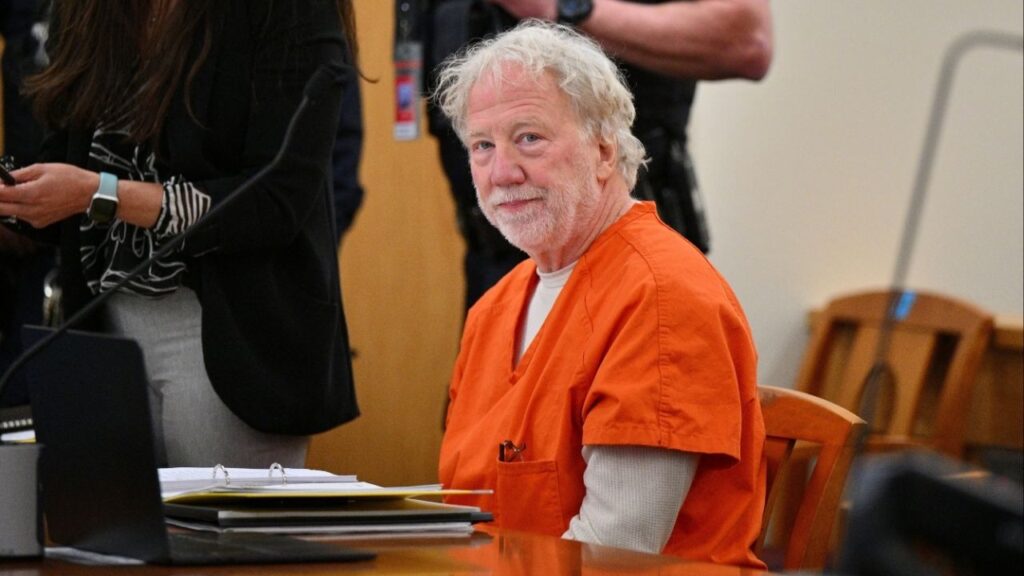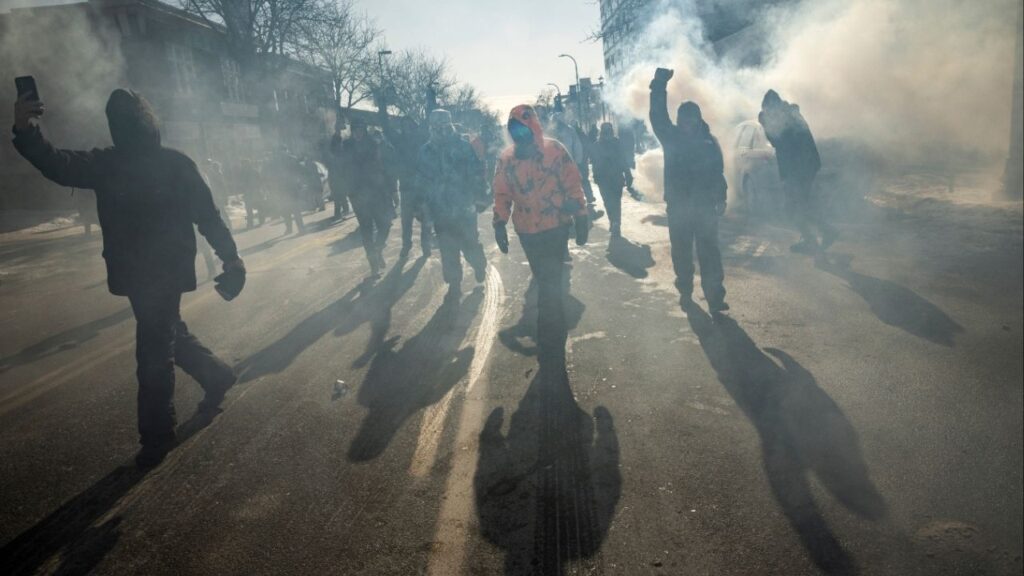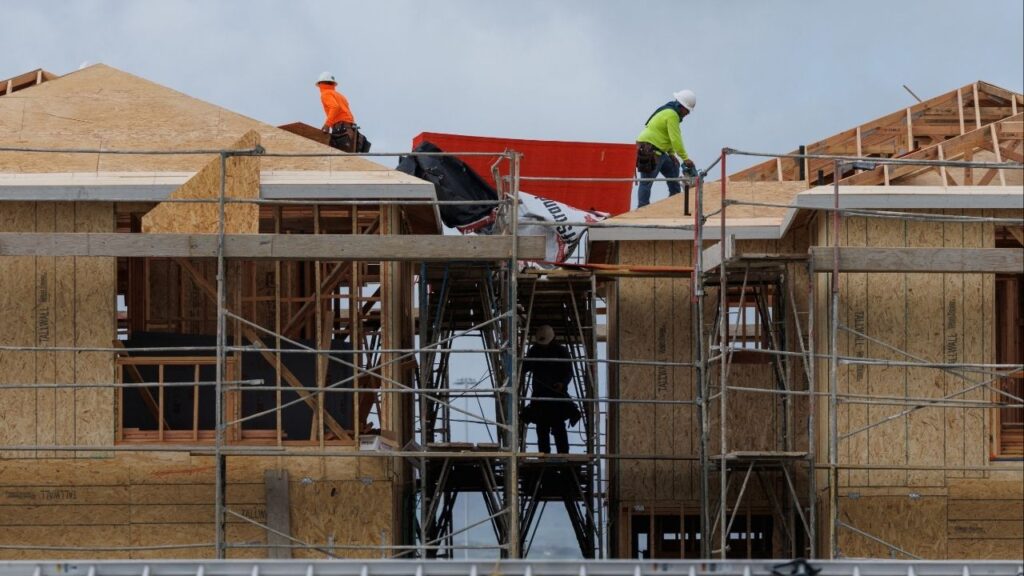Share
MERCED — Scott McBride was recently sworn in as Merced’s new city manager, taking the helm as top administrator during a crucial time of growth.

Brianna Vaccari
Central Valley Journalism Collaborative
For example, work is underway to annex UC Merced into the city limits, along with a new community that would connect the city to the campus.
That’s a project McBride is intimately familiar with as he also works as the acting development director for the city until a permanent replacement is found.
He worked as development director for six years before the City Council appointed him to his new job.
McBride’s main duty as city manager is to manage the day-to-day operations of City Hall, including 530 employees who serve Merced’s nearly 90,000 residents.
He succeeds Stephanie Dietz, the first woman to hold the job of Merced city manager. Before starting his Merced job, McBride worked for the City of Atwater in a similar position. He also
worked a stint as interim city manager there, but ultimately he decided not to pursue the role permanently.
As city manager, McBride will earn $240,000. His contract is for three years.
McBride recently sat down with CVJC to discuss his new role. The conversation below has been lightly edited for brevity and clarity.
CVJC: It seems to be the general consensus that your predecessor is leaving the city in good shape. How will you carry that forward?
McBride: Stephanie had a really aggressive agenda. I think that she worked very well with the council and with the community.
We have these annual goals and priorities that we set every year. One of the big priorities for me coming on board is, we haven’t made a lot of progress on some of them. We’ve had some
longer term vacancies in our technical positions that pushed some things behind. So that’s kind of my No. 1 priority, which is to reorganize our existing goals and priorities.
A lot of it might be like we’ve got some funding that is expiring, we’ve got some limit on time we need to keep, and so we need to try to push through those.
I’ll give you an example. We have the American Rescue Plan Act funded projects. We’ve got to have the funding fully expended by 2026.
There are other ones, though, that have different funding sources where they’ve got timelines, so we need to be organized. Again, a lot of these are more capital projects, but not entirely.
There’s some programs, too, with ARPA funds that tie back to the same schedule.
That’s kind of our No. 1 priority – really trying to get back on track with meeting the expectations for our goals and priorities. Beyond that, it’s an interesting time.
We’re starting off the time of the year where we’re organizing for our next budget cycle. So some of that started last week.
We worked with our finance officer on a five-year financial update. So it’s usually kind of setting the stage for what we’re seeing coming up, not really necessarily for any council action, but just to share issues that we’re seeing that are coming up that we have to be cognizant of.
One of the things that I’ve been very familiar with since being with the city for the last six-plus years is really what has happened in our development services area.
One of the things we really were very clear about (at the Nov. 20 City Council meeting ) is there’s been a softening of our housing development. That has ripple effects throughout the budget and our funding sources. It affects community facility districts that we have arranged that support new housing. They’re not being added, and there’s funding that’s not there for them, which affects police and fire services. The permit fees, application fees, those do a lot internally for development services.

When you talk about a softening in housing, what does that mean?
McBride: Two years ago, we had our highest number of single family (home) permits – over 700. We had another year that was around 500. The last couple of years, we’ve seen more around the 200s. We’ve adjusted our annual forecasts to about 200 a year, and we’re probably going to be on target for that. Year to date, for our tracking, we’re only at 85. So we’re six months in, which doesn’t mean we’re that far off, but it’s far different from where we were a few years ago.
Other issues that we discussed that we’re going to keep monitoring are our Measure Y funding, our cannabis revenue sources. It’s really been very unpredictable. It’s not something that we can
really project at this point. So it’s challenging to budget for expenditures when you’re not exactly sure what it’s going to be every year.
Probably the biggest issue we addressed (at the council meeting) was the local voter initiative or public safety measure, Measure C.
Clearly, people will decide what’s going to happen in March, but we do have to plan for alternatives if that’s not approved. So that’s clearly probably the most significant issue, and we’ll
see that coming up very quickly.
So for me, it’s really about carrying forward existing goals and priorities, working through the budget process. There are many other items that the council has listed as policy priorities they
want to get through. …There’s five or six that are on the list that I want to have a discussion about. … like we’ve been working on a vacant building ordinance, we’re working on a shopping
cart ordinance.
I want to go back to Measure C. The police department is struggling with staffing. What options are there to tackle that without Measure C?
McBride: We do have a (police) new chief who has come on board, and he’s actually filling vacant positions that he can. He just promoted (staff to) lieutenant, sergeant, and captain positions.
There has been a long-term list of positions that haven’t been able to be filled. He’s optimistic that maybe with some connections and outreach, he can find some candidates who are interested in applying to Merced.
He’s actually been talking about a concept of maybe taking some of the positions that are sworn officers and making them non-sworn officers. So many of the priorities that the community is
asking for can be done with non-sworn officers. So that’s something we definitely want to talk about, and maybe we can start to get the numbers to do more focused work.
Despite how we do reallocation, I would say this: Across the board of the city as an organization, the recruitment and retention of our employees has become a much bigger issue. One of the reasons why we’ve got some slow down in meeting a lot of the capital goals and priority projects – they’re really because we have some vacancies in our engineering division.
We’re actually starting to see that now in our planning division as well. A whole series of our higher-level positions are vacant. So to keep us on track with what they want to achieve, it’s
going to be challenging.
The city did receive a SAFER grant for 24 positions, firefighter(s) and paramedic(s). That’s a great resource that we have, funding options for about a three-year window.
Now we’re looking at this in the future. We’re going to work toward building another (fire) station. We already have funding for it through Esmeralda Soria’s office. We’re trying to budget for equipment, with the idea being that we take this seed of these new firefighter positions and it carries forward to be staffing for that new station. Plus, it provides staffing to existing stations to bring them to a higher level of service.
The benefit of that is then lower rates for insurance across the board, but also having some more flexibility and backup. Right now, we’re at the number that when people are out, we have to call folks back in for overtime.
Now what do we do if Measure C isn’t voted in?
McBride: I’m hopeful that we don’t get to that point. Even though it’s a new item, it’s not like it’s an additional tax. It’s just basically extending what we already have. So I hope that voters understand that. It’s not like it’s a huge number, it’s basically the same number they’re paying already, I think, for somewhere around 31 or 32 positions in public safety. I think it’s close to 20 or so for police, and the bulk of the other ones are in fire.
Normally your funding sources for police and fire, there’s not a lot of them – the general fund, and Measure C, obviously. And then we have these community facility districts that we form, that are part of new development. So that’s kind of what we have to work with. And although we have a reserve and general fund, that’s probably the one area where, if Measure C were not to be extended, we’d have to look to absorb some of those back in. That may not be supportable for long term. So there’s a lot of calculations that have to happen in a short time period, between March and June, to be prepared for the budget.
You’ve talked a lot about staffing and how it’s been a challenge. How do you continue to provide the basic services and good customer service with those challenges?
McBride: Well, we are fortunate in that a lot of the divisions that provide most of the day-to-day operations, they’re in a good position for staff.
Our public works division, which does solid waste and water, wastewater, park maintenance – there’s not a lot of deficiencies there. Our finance division, which handles our financial transactions, customer support for bill payers – we’re in a good position there.
Where we’re deficient, unfortunately, it’s primarily in our development services area. And then the deficiencies we talked about in the police department – those are kind of major.
Most people don’t rely on development services for their day-to-day needs. In areas where we do have day-to-day needs, like plan review, or building permits, or entitlements, we’re good at that level.
Where we’re deficient is more for longer-term, advanced projects. They’re more complicated – the exact things we’re starting to get into – as we go through the university annexation and the surrounding areas, and also as we start to plan for the future with the general plan update, and then other associated documents.
Talking about growth, affordable housing and the annexation of the UC, how do you grow responsibly without leaving south Merced further behind?
McBride: Let’s start by what we are doing and what’s working.
I would actually modify that a little bit. It’s not just south Merced that was left behind. It’s lots of neighborhoods in a lot of different areas that, perhaps, are not having the same amount of investment they used to.
So we currently are optimistic that we’re going to have a 100-unit supportive housing project on V Street. This is a state Homekey-funded project – $24 million in Homekey funding.
We also have another project that’s about 20 units on south R Street. Again, this is for support units, but those are for our veterans.
We have something like another 400 affordable units we’re working on in three or four different projects that are in some various stages of approval, working through agreements for funding. …We’re going to be seeing that start to come to the City Council for these newer projects the first part of the year, and construction somewhere thereafter.
So it has been a strong long-term commitment and something that Stephanie and I have worked on together since I came to the city. It’s going to continue going forward. The council has made amazing contributions of funding and support for these. We’re going to carry this forward. We’re working directly on providing affordable housing opportunities.

Can you explain the importance of High-Speed Rail to Merced and the challenges and opportunities the project will present?
McBride: The city of Merced is included in Phase 1 of the state High-Speed Rail plan. It will be a unique station. It will combine several services into one location. This location will include rail service from ACE – Altamont Corridor Express, Amtrak San Joaquins, and High-Speed Rail. Rail service south of Merced will no longer be on Amtrak. It will all be High-Speed Rail. There will also be bus and intermodal connectivity to the location.
During construction, there will be localized impacts on traffic, businesses, and area residents. The city will be working with the technical and design teams for the various rail services to coordinate utility relocation and other issues.
There will be many positive benefits through construction and the ongoing operation. Construction of the lines and station will bring a significant number of jobs into the community. Ongoing operations will also have a positive impact. As part of the combined project, a layover maintenance facility will be constructed in Merced.
The location of the station between 15th and 16th and R Street to O Street. will create opportunities for new community investment. To better anticipate land use needs, the city will be implementing a station area plan that will be implemented into the city’s general plan. It’s anticipated that the area surrounding the station will provide opportunities for job creation, new housing opportunities, and also support arts, culture, and entertainment.
The station will be transformative in attracting new investment, but also create future connections. Future phases of the High-Speed Rail project will connect to the south Bay Area west of Merced. That connection will provide for a 45-minute travel time to reach San Jose.
What’s your vision for the city moving forward? When you eventually leave this position, what do you hope to have accomplished?
McBride: Right now I feel like I’m kind of in the middle of the trees. I’m trying to get where I can see over the top of it.
There are a lot of things that are happening concurrently – the budget process, working to integrate policies issues, trying to get our projects on track or going … I’m hoping to make some progress on that so I can rise and see the long-term vision.
I would like to say this: I would hope that when I’m leaving, that we’ve maintained and built stronger community partnerships; that we’ve made a real commitment to providing affordable housing throughout the entire city; that we’ve achieved success on the council goals and priorities; that we’ve planned smart for the future growth and financial success – make sure we’ve got a good financial plan in place and that it will provide for the city’s needs and residents’ and community’s needs.
I really hope to be judged more on what we’ve done – saying we’re gonna do what we’re gonna do, and being held accountable to it. I’ve been in local government for 29 years. I’ve always told what I know I can deliver and tried to achieve above it. I’ve never been one to say we can do all these things. I don’t want to set this up for unrealistic expectations.
About the Author
Brianna Vaccari is the governmental accountability/watchdog reporter for the Central Valley Journalism Collaborative, a nonprofit newsroom based in Merced. Sign up for CVJC’s free Substack list here and follow CVJC on Facebook.
RELATED TOPICS:
Categories

Dollar Retreats From Two-Week High, Yen Set for Weekly Loss

‘West Wing’ Actor Timothy Busfield Indicted on Child Abuse Charges

Bitcoin Bounces Back as Risk Assets Stabilize















